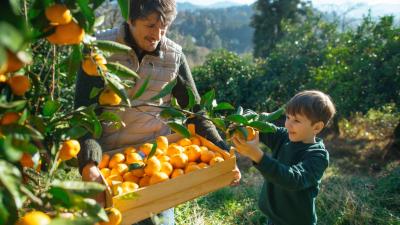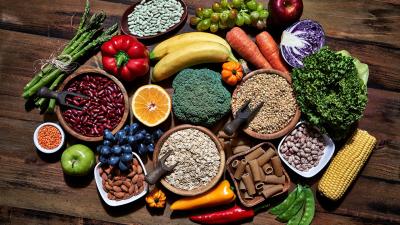Vermont Farming Family Is Finding Success Growing Specialty Crops and Grain After Phasing Out the Dairy

ESSEX JUNCTION, Vt.—The Whitcomb family farm in Vermont has phased out the dairy operation, but the sixth and seventh generation farmers are finding success growing specialty crops including pumpkins, butternut squash, apples, and Christmas trees. They also grow corn, soybeans, and hay while the cow barn stands empty, as reported by the Burlington Free Press. The Whitcomb family farm has been in operation since 1867.
In recent years, the Whitcombs’ dairy experienced a shortage of workers—even though it had robots—but the farmers avoided hiring undocumented migrants. Without an adequate workforce, the family decided to close the dairy. Nationwide, many farmers are closely monitoring the Trump administration’s statements on migrant farm workers. In April, eight migrant farmworkers were arrested at a Vermont dairy farm, and three were deported to Mexico, according to Vermont Public.
As the members of the sixth generation of farmers begin to think about retirement, the younger family members, Cale, Dane, and Max Whitcomb have a vision for the future of their family farm. The nonprofit Physicians Committee has given the Whitcombs a $15,000 farm transition grant for equipment and supplies relating to the production of specialty crops. In spring, the farmers purchased a two-row planter for planting pumpkins, popcorn, and squash.
The grant from the Physicians Committee can also be used for expenses relating to expanding the apple orchard—the Whitcombs have grafted dozens of apple trees and placed them in a raised bed where they will grow for a year before being transplanted. In order to replace the manure produced by the dairy cows, the farmers will purchase fertilizer with funds from the farm transition grant.
The Physicians Committee is a national health advocacy organization with 46 doctor members in Vermont and 17,000 physicians nationwide. The Physicians Committee’s farm transition grant program is modeled on a program established by lawmakers in Vermont who provided grants to farmers who wished to diversify or transition from one type of farming to another. To learn more, visit the Physicians Committee’s webpage www.ConvertToCrops.org.
“Locally grown produce like pumpkins and butternut squash are highly valued by Vermonters. Across the state, farm stands like the Whitcombs’ provide both locals and visitors with fresh, nutritious, farm-to-table food, while offering farmers a sustainable path to economic viability,” says Noah Praamsma, MS, RDN, a dietitian born and educated in Vermont, now on the staff at Physicians Committee. “Patronizing your local produce stand, pumpkin patch, or Christmas tree farm is more than just a purchase—it’s a fun, hands-on learning experience, especially for kids, and strengthens the connection between Vermont’s family farms and the communities they belong to.”
Vermonters who buy pumpkins to carve into jack-o-lanterns in the fall as the nights grow longer, should be sure to scoop out the pumpkin seeds and roast them. Pumpkin seeds are a healthful snack all year round, and they provide you with protein, iron, fiber, healthy fats and many other nutrients. In Vermont, pumpkins tolerate the short growing season and are grown on about 570 acres according to the U.S. Department of Agriculture.
The Whitcomb family farm stand will offer pie pumpkins, which can also be roasted and eaten as a main dish, according to Denee Bex, a Navajo dietitian. Pumpkins are native to the Americas and have long been farmed by Indigenous people. Pumpkins and butternut squash are natural sources of many nutrients that support heart health, including potassium, calcium, and magnesium. The beta-carotene that gives these veggies their orange hue is used by your body to make vitamin A, which boosts your immune system and provides other benefits.
If dairy farms are being phased out and milk production declines, what are your alternative sources of calcium? In Vermont, farmers grow many sources of calcium including sweet potatoes, hazelnuts, and kale. Health-conscious consumers often reach for plant milk, and there are many varieties including hazelnut milk which is creamy and delightful according to Bon Appetit.
Due to economic hardship or other factors, many dairy farmers are choosing to exit the business. Lancaster Farming reports that New Jersey farmer Ed Clerico is planting hazelnut trees on the 38-acre former dairy farm where he grew up. In Wisconsin, Greg Zwald embraced the life of a dairy farmer, but things changed and he now runs a pick-your-own-berries enterprise. Farm Progress reports that Carl Taber, a former dairy farmer, is now focusing on field crops, including chickpeas.
If you visit your local farmers market and shop for plant-based meals, you can cut food costs by 19%, when compared with a standard American diet, according to research published in JAMA Network Open. How does this affordable, plant-based diet benefit your health? According to published scientific research, a plant-based diet can help you maintain a healthy weight, lower blood pressure, and improve heart health, among other benefits.
A recent study with 22 pairs of identical twins found that a plant-based diet improves heart health in as little as eight weeks. The twins following a plant-based diet experienced lower LDL or “bad” cholesterol, and they lost more weight than the omnivore twins.
Spiced Pumpkin Bread sweetened with maple syrup is one of the many ways you can prepare this versatile member of the squash family. You can also enjoy pumpkin soup, pumpkin smoothies, and Spiced Pumpkin Oatmeal with cranberries. Butternut squash is a superfood with a mildly sweet, nutty flavor and it’s popular with home cooks for both sweet and savory dishes, including Butternut Breakfast Tacos.
The Physicians Committee established its farm transition grant program to assist farmers who are growing healthful plant-based foods while phasing out animal agriculture. One grant recipient is a former poultry farmer in Alabama who is now growing hydroponic leafy greens in a retrofitted chicken barn, as reported by the Dothan Eagle, Farms, AgFarmNews, and other news outlets. The farmer has purchased a refrigerated trailer to deliver fresh veggies to local farmers markets, grocery stores, and schools. He is also expanding his indoor hydroponic farm with Dutch buckets for growing strawberries, cucumbers, and tomatoes. In late fall, he will plant peach trees.
As reported by the Omaha World Herald, Nebraska Public Media, KOLN-TV, and many other news outlets, the Physicians Committee has given a farm transition grant to a fourth-generation Nebraska farmer who is rewilding her family’s former cattle ranch. Since the farm borders the Middle Loup River, and flooding is a concern, she is stabilizing the riverbanks with native plants including buffalo berries, raspberries, and elderberries. The riparian berry thickets will provide food and cover to birds, butterflies, and other wildlife.
Media Contact
Jeanne Stuart McVey
202-527-7316
jmcvey[at]pcrm.org
Founded in 1985, the Physicians Committee for Responsible Medicine is a nonprofit organization that promotes preventive medicine, conducts clinical research, and encourages higher standards for ethics and effectiveness in education and research.







